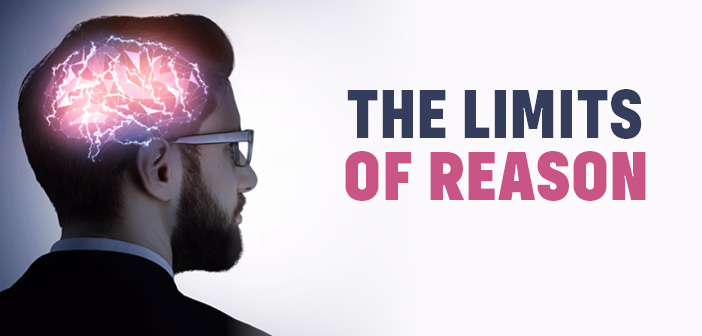What are the limits of reason in Islam?
An everlasting salute to our Beloved Prophet –upon him blessings and peace- as well as his family and Companions, who contemplated the universe, humanity and the Holy Quran in the profoundest, most beautiful and feeling manner and taught his followers to read all of these with the eye of the heart.
Islam places great importance on reason; so much so that it regards reason as one of the two prime requisites of being held accountable for actions.[1] At every opportunity, it advises one how to utilize reason in a befitting manner. But it also states that the capability boasted by reason to comprehend is not unlimited, as Allah, glory unto Him, has not endowed any creation with unlimited powers.
Similarly to how vision and hearing are limited in their exercise, so also is the power of rational comprehension. Just as the existence of countless beings is not exhausted by the fact they elude eyesight, and there are a host of sounds that are inaudible simply because they exceed the power of hearing, there is a myriad of truths that, remaining outside the capacity of reason, transcend reason’s attempts of comprehension. Reason therefore does not suffice on its own to grasp reality in its totality.
While they have promised happiness, rationally inclined philosophers, who have regarded reason as the font of unlimited powers, have only ended up dragging the people they were able influence into a state of distress.[2]
Allah, glory unto Him, who indisputably knows the flaws and shortcomings of His servants infinitely better than the servants can ever hope of knowing in themselves, sent throughout the history of humankind –according to tradition- over 124,000 prophets, all of whom were subjected to Divine Revelation, and reinforced them with scriptures, books and the most potent of aids to guide humankind to the truth and to help them rectify the flaws they cannot by themselves overcome.
It is therefore imperative for reason to undergo training under wahy, Divine revelation. Reason untouched by the guidance of Divine revelation is like a wild, untamed horse that not only does not comply with his rider in his hope of reaching his destination, but flings him over the edge of a cliff to perish. Just as the best way to tame a horse is to bridle it and train it, it is necessary to subject reason to the spiritual training of wahy and its clarification, the Sunnah of the Blessed Prophet –upon him blessings and peace-, and thereby set reason right. Until this is done, reason is like a weapon; it may strike for the better, but also and detrimentally, for the worse…
[1] One of the prerequisites of being held accountable in the sight of Allah, glory unto Him, is to have reached puberty, while the other is to be sane, that is to have the rational aptitude developed enough to discern right from wrong. In line with this criterion, children and the insane are not considered by Islam to be liable for their actions.
[2] An incident reported to have taken place in Ancient Greece is emblematic in displaying the shortcomings of reason. Accordingly, a young man once requested a reputed philosopher to train him in legal matters. As agreed, half the philosopher’s wage was to be paid in advance, while the other half after the young man succeeded in his first court case. Triumph in his first court case would supposedly show that he received a perfect legal training, meaning his teacher would rightfully deserve the second installment. At the end of his legal training, however, the young man requested his teacher give up his rights to the second installment, suggesting the payment he had already received in advance was duly sufficient. Because of this dispute, the first court case took place between the young man and his teacher. So the hearing began. The young man, addressing the panel of judges, said:
“Whether I win or lose this case, I should not be paying the second installment regardless.”
“Why is that?” asked the high judge, upon which the youth replied:
“If I win, I will not be paying due to your ruling. If I lose, I will not be held liable with the payment according to our prior agreement with the claimant.”
In response, his teacher, the philosopher, spoke with a similar tone.
“Whether I win or lose”, he said, “I should be taking the second installment of my payment.”
“Why?” asked the high judge, once more.
“If I win, I will be receiving the payment due to your ruling. If I lose, I will be receiving it according to our prior agreement with the young man.”
Evidently, both cases are sound and logical, which goes to show that reason and logic can, time and again, become imprisoned between walls they themselves erect and become stranded in a dead end road. For reason, which miserably breaks down even when trying to find a solution for many a human predicament, it is impossible to grasp the infinite Divine truths in all their aspects. The deliverance of reason from these dead ends therefore lies in coming under the training of Revelation and recognizing the need to spiritually surrender to truths that surpass its limits of comprehension.
Prophet –upon him blessings and peace-, and thereby set reason right. Until this is done, reason is like a weapon; it may strike for the better, but also and detrimentally, for the worse…
Source: Osman Nuri Topbaş, Contemplation in Islam, Erkam Public.



